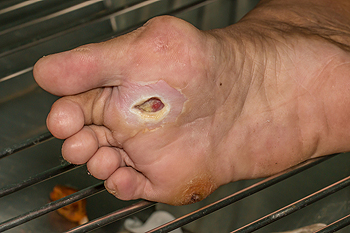 It’s very common for wounds to form on the feet, especially for someone who has diabetes. One of the most common foot conditions that form, due to diabetes, is called an ulcer. Foot ulcers are open sores that can be very deep, and in severe cases, may require amputation if left untreated. Treating diabetic wounds can be difficult if a diabetic patient is also afflicted with peripheral neuropathy. This condition causes a lack of feeling in the feet. If a wound goes unnoticed or untreated, there is a strong likelihood that it will become infected. There are a number of different risk factors that can lead to the development of a diabetic wound, including a structural defect, and poor diabetes control. If you have developed a wound on your feet, it is highly recommended that you consult with a podiatrist who can help treat this condition.
It’s very common for wounds to form on the feet, especially for someone who has diabetes. One of the most common foot conditions that form, due to diabetes, is called an ulcer. Foot ulcers are open sores that can be very deep, and in severe cases, may require amputation if left untreated. Treating diabetic wounds can be difficult if a diabetic patient is also afflicted with peripheral neuropathy. This condition causes a lack of feeling in the feet. If a wound goes unnoticed or untreated, there is a strong likelihood that it will become infected. There are a number of different risk factors that can lead to the development of a diabetic wound, including a structural defect, and poor diabetes control. If you have developed a wound on your feet, it is highly recommended that you consult with a podiatrist who can help treat this condition.
Wound care is an important part in dealing with diabetes. If you have diabetes and a foot wound or would like more information about wound care for diabetics, consult with one of our podiatrists from Sutera and Jones Surgical Podiatry. Our doctors will assess your condition and provide you with quality foot and ankle treatment.
What Is Wound Care?
Wound care is the practice of taking proper care of a wound. This can range from the smallest to the largest of wounds. While everyone can benefit from proper wound care, it is much more important for diabetics. Diabetics often suffer from poor blood circulation which causes wounds to heal much slower than they would in a non-diabetic.
What Is the Importance of Wound Care?
While it may not seem apparent with small ulcers on the foot, for diabetics, any size ulcer can become infected. Diabetics often also suffer from neuropathy, or nerve loss. This means they might not even feel when they have an ulcer on their foot. If the wound becomes severely infected, amputation may be necessary. Therefore, it is of the upmost importance to properly care for any and all foot wounds.
How to Care for Wounds
The best way to care for foot wounds is to prevent them. For diabetics, this means daily inspections of the feet for any signs of abnormalities or ulcers. It is also recommended to see a podiatrist several times a year for a foot inspection. If you do have an ulcer, run the wound under water to clear dirt from the wound; then apply antibiotic ointment to the wound and cover with a bandage. Bandages should be changed daily and keeping pressure off the wound is smart. It is advised to see a podiatrist, who can keep an eye on it.
If you have any questions, please feel free to contact one of our offices located in Media and Glen Mills, PA . We offer the newest diagnostic and treatment technologies for all your foot care needs.
Read more about Wound Care